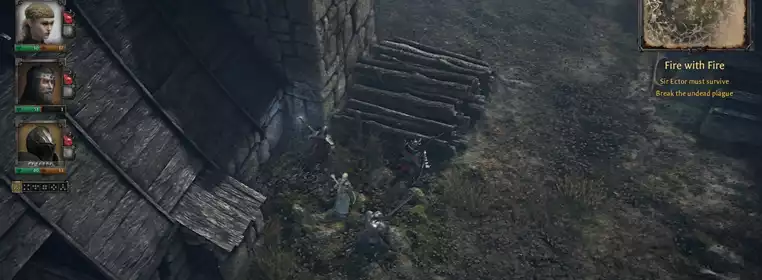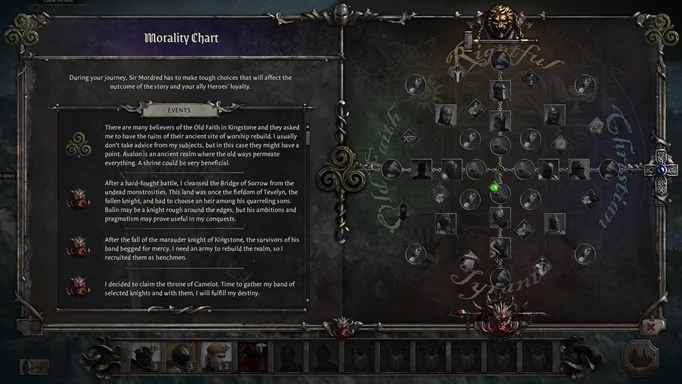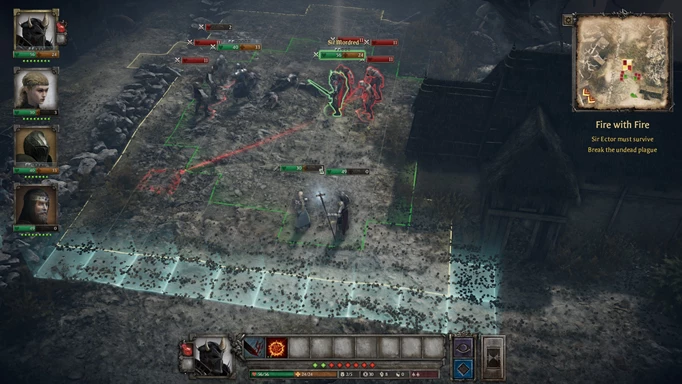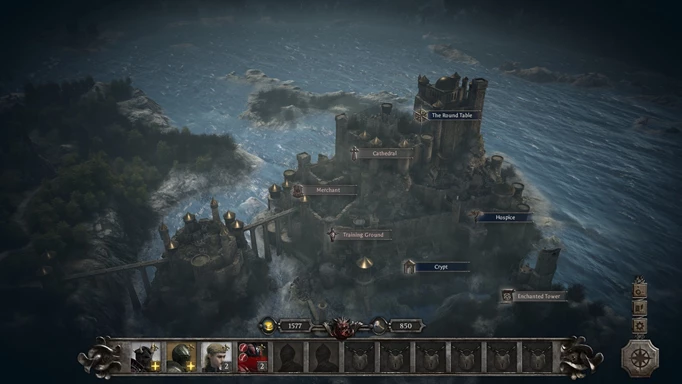King Arthur: Knight's Tale Preview: "A Sword And Sorcery XCOM-Alike"

Controlling huge, ironclad knights with claymores swords and giant shields is a classic concept that's hard to mess up, and it's the central thrust of King Arthur: Knight's Tale. Set in a grimdark version of the Arthurian legends where the kingdom of Avalon was inverted into a purgatory, you'll actually play the big-bad of many Arthurian tales - Mordred.
See, Arthur and Mordred struck one another down at the same time during battle, and not only has it cursed all of Avalon, but it's caused Arthur to turn evil. Somehow fate has chosen Mordred to take charge of sorting this mess, and along with a myriad of knights - who are both friend and foe - you'll set out on a quest to finally vanquish evil Arthur.
Rightful Ruler Or Terrible Tyrant

 Click to enlarge
Click to enlargeFor fans of the Arthurian mythos, this premise likely sells itself with its twist on the typical presentation of these stories, along with it casting many of the heroes and villains of Medieval British folklore in a new light entirely. Due to the circumstances, Morded is somewhat of an anti-hero by default. However, there's a whole morality-based choice system that can see you redeeming him into a chivalrous knight, or pushing him further into tyranny as Camelot comes under your control.
This is where some key mechanics come into play outside of missions and combat. You gain control of Camelot (Arthur's old castle and court) early on, and with money and building resources you gain from quests, you can rebuild it. It's a fairly basic system, letting you, for example, construct a hospice and merchant for healing and trading needs, along with varying upgrades to make them better. You even take control of the Round Table itself, giving companions titles to earn their favour.
Each character has a loyalty rating toward Morded, with the more honourable servants of Arthur containing a pretty strong dislike for you, only tempered by the need to save Avalon. As the game moves forward, the choices you make will determine whether these companions stick around and support you, or abandon the cause. The morality system even comes with a handy chart, with axis' for rightful and tyrant, and Old-Faith and Christian. The existence of this second axis for religion is what stops the morality choices in this game being purely binary. They do ultimately come down to 'do good thing or do bad thing' but being able to contextualise that in your religious beliefs in-game, richly enhances each choice.
Swords And Sorcery

 Click to enlarge
Click to enlargeWhile party management, castle management, and moral quandaries made up a good portion of the Act One experience - the turn-based combat is the core of the game, and your experience with it will vary wildly. It's pretty standard as far as turn-based gaming goes, with each character getting a number of action points (AP) to move and perform actions on their turn. Movement and positioning is the key to winning battles though, as you will be outnumbered three-to-one in most fights.
You can only take four characters into a mission, and there are six classes - three melee and three ranged. Strategy-wise, it's essential to have a ranged character in the party to alleviate the swarm your close-range fighters will deal with, especially once the balancing starts to shift.
There is a stark jump in difficulty once you hit level four and begin the Old Monastery mission, and with a permadeath mechanic that can lead to you having to restart because too many characters died, it can very quickly sap your joy. For some, these masochistic mechanics and the tension that arises from them, is just as much a part of the experience as the victories, but it's important to bear in mind that if you're new or unfamiliar with these types of games, then disabling Ironman mode and enabling manual saving is a must.
The presentation of the combat could also do with some work, as there is a real lack of physicality and weight to the characters. These are huge knights in suits of steel, but every hit sounds like cutting into fruit, and there is barely a distinction between a character's armour, health, or vitality taking a hit.
A Grimdark Folk Tale

 Click to enlarge
Click to enlargeIf the allure of tough-as-nails games is up your alley, then King Arthur: Knight's Tale may serve as a sword and sorcery XCOM-alike worth picking up. The realm management system and the need to balance the loyalties of your companions enhances it beyond a simple turn-based RPG, and these systems have the potential to personalise each playthrough.
For fans of King Arthur looking for an accurate representation of their favourite myths, you may be sorely disappointed, but if you want a grimdark remix of traditional tales of chivalry, look no further.